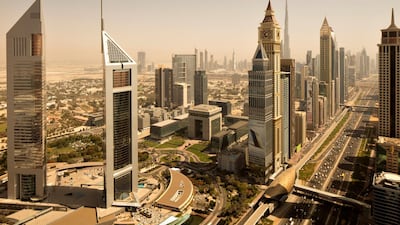Business activity in the non-oil private sectors of the Arab world’s two biggest economies continued to improve in July, with the UAE hitting its highest level in two years as demand continued to rebound from the coronavirus-induced slowdown.
Saudi Arabia's IHS Markit Purchasing Managers' Index pointed to a further expansion in the kingdom’s non-oil economy, but at a slower place. The index fell for the first time in four months to 55.8 in July, from 56.4 in June. A reading above 50 indicates economic expansion while anything below points to a contraction.
Business conditions in Saudi Arabia, Opec’s top oil exporter, have improved in each of the past 11 months as it continues to recover from the pandemic that severely disrupted economic momentum last year.
“Sustained rises in demand should help the economy move closer to full capacity over the second half of the year," said IHS Markit economist David Owen.
Output in the kingdom's non-oil sector also rose in July. More than a quarter of surveyed businesses reported an increase in activity, linked to strengthening client demand and a loosening of pandemic-related measures.
While slower than June's five-month high, the pace of new order growth also rose at the beginning of the third quarter. Panellists attributed the increase to pricing strategies and rising demand from domestic and overseas clients.
However, hiring in the kingdom's non-oil private sector grew at a fractional pace. Backlogs also fell, pointing to a gap between demand and full capacity utilisation by businesses despite a sharp increase in new orders in recent months.
"While the Saudi Arabia PMI continued to signal strong growth in the non-oil economy", challenges still remain, Mr Owen said.
However, the rate of growth in the UAE's non-oil economy was more robust, with the headline PMI reading rising to 54 in July, from 52.2 in June, while employment in the country rose at its fastest rate since January 2019, according to the survey.
The output and new order indexes also followed last month's upward trajectory, hitting their highest levels since July 2019. The increase in new orders in June was the eighth rise in nine months, with businesses expecting further recovery in demand as Covid-19 restrictions continue to be eased.
"The UAE's non-oil sector enjoyed a busy start to the third quarter of the year as firms saw the sharpest rise in new orders for two years amid soaring domestic sales and strengthening market confidence," said Mr Owen.
"At 54 in July, the headline PMI was broadly at its long-run level to suggest the economy was largely back to normal growth."
However, diverging economic recoveries in other parts of the world led to a fall in export sales during July, with UAE businesses increasingly turning to the domestic market to win over new clients.
Global lockdown measures enacted to curb the spread of the Covid-19 Delta variant also affected the supply of inputs, particularly from Asia, where the number of infections is on the rise.
Businesses remained positive in July about the outlook of future non-oil activity growth and said the easing of Covid-19 restrictions and the Expo 2020 Dubai, scheduled to be held later this year, would help improve economic conditions.
Both Saudi Arabia and the UAE have eased Covid-19 restrictions amid rapid vaccination campaigns. However, some travel restrictions remain in place due to a surge in more virulent coronavirus strains in some Asian and African countries.
On Sunday, the UAE overtook the Seychelles to become the world’s most vaccinated country, with about three quarters of the public having received at least one dose, according to data compiled by Bloomberg.
The UAE has administered more than 18.8 million doses of vaccines, enough to vaccinate about 78.3 per cent of the country's population. In Saudi Arabia, 27.7 million shots have been administered, enough for more than 40 per cent of the kingdom's population, according to Bloomberg's vaccine tracker.
Meanwhile, business conditions in Egypt's non-oil private sector economy deteriorated marginally, with headline PMI reading falling to 49.1 in July, from 49.9 in June. Demand receded as some customers remained reluctant to spend amid the continued effects of the pandemic.
However, the health of the Egyptian job market improved with the first rise in employment levels since October 2019.
"Employment growth across the Egyptian non-oil economy in July pointed to improved confidence that the worst impact of the pandemic is over," said Mr Owen.
"Many businesses are now eager to boost capacity, particularly as new order growth recorded in June led to a modest pile-up of outstanding work in the latest survey period."
Business confidence towards future output outlook remained positive in July, with more than 51 per cent of panellists saying that they expect activity to increase over the next 12 months.


